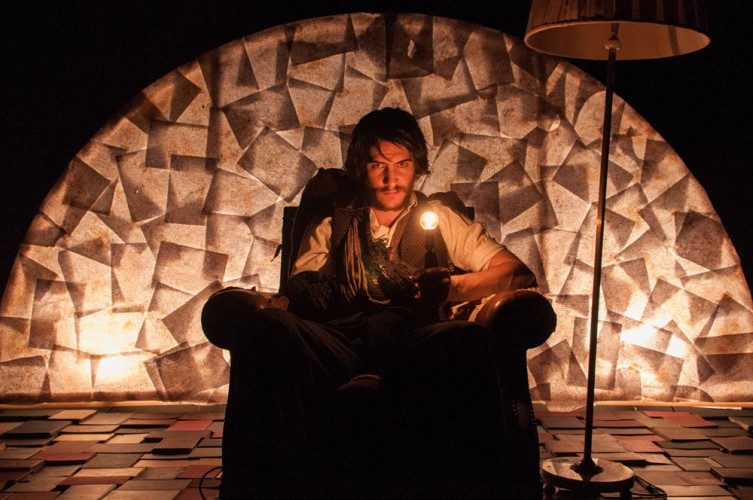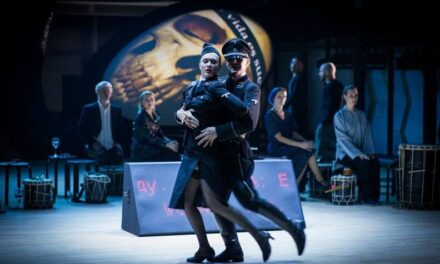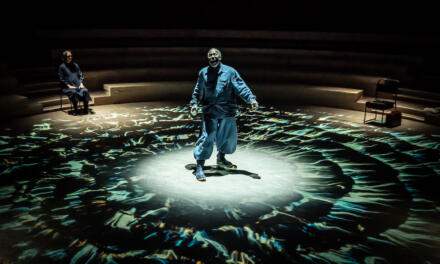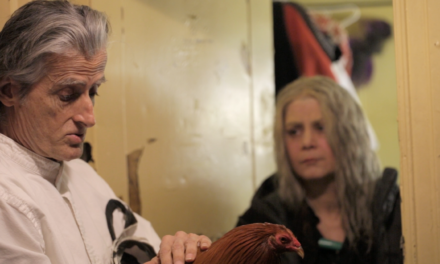British actor Harry Lloyd and French director Gérald Garutti’s stage adaptation of the Fyodor Dostoevsky novella, Notes from Underground, was created in Paris in February 2014 and is currently running at Notting Hill’s Print Room Theatre. Lloyd studied at Oxford University and has performed extensively in theatre, film, and television, including leading roles in HBO’s Game of Thrones and Channel 4’s The Fear, which earned him a BAFTA nomination in 2013. Garutti is a theatre director, author, and translator who studied at Sciences Po and Cambridge University and is the artistic director of the C(h)aracteres Theatre Company. He was the dramaturg of several Moliere award-winning plays at the French National Theatre, including Coriolanus, and is the Head of Theatre at Sciences Po Paris. Emily McGovern met up with the pair in The Print Room’s labyrinthine backstage area to discuss the trials and rewards of adapting Dostoevsky for the stage, as well as the story’s continuing relevance to the modern world.
Emily McGovern: Tell me a bit about the adaptation process – you arrived at the novel separately, but did you both immediately envision how it was going to be on stage?
Harry Lloyd: I had no idea. I just listened to Gerald. I knew that I wanted to work with him and that we should do a one-man show because it would be quicker. Notes from Underground was the last book I’d read and I really related to it. I thought he was a fascinating character, and I had ideas with Gerald as to how to clarify it and structure it. But I had no idea how to stage it, how to act it, how to shape the material into something an audience could sit through for 70 minutes – that was all Gerald.
EM: So was it always just going to be one man sitting on a stage?

Notes from Underground Director, Gerald Garutti Photo Credit: Gerald Garutti
Gerald Garutti: It was always going to be a monolog just for practical reasons – time constraints and so on – but also because we were interested in exploring the inner underground of the character. At some point, we thought we might have passers-by walking across the stage, but quite quickly we agreed that the loneliness of the character was the essential element. The key was finding how the character was going to interact with the audience – is the audience actually there? When you read a novel it’s just you, and you hear the words echoing in your consciousness so it’s a dialogue between yourself and the page. It’s almost Protestant, in a sense – a dialogue between God and your inner self. We had to take this element out and connect the voice to the audience – that’s the whole point of theatre, really. We experimented with different ways of getting this across and finally, we found the solution, which was to negate the audience at the very end – to act as though there is an audience throughout and finally show that he’s really just talking to himself. That’s part of why the stage is designed as an island of books, like an internal shipwreck.
EM: What is the role of the audience in the play? The character is interacting with them from the minute they walk in the room – does their reaction affect your performance?
HL: Yes, and the tricky thing, as Gerald very astutely put the other day, is that I have to be completely immersed and interactive with them, but not depend on them. When I get a fun audience who are completely engaged and I’m holding them in my hand, it gives me an energy and a confidence so then I can play with it and it comes very naturally. Then sometimes you get little shuffle-y audiences, and someone’s asleep and someone’s phone goes off, and someone leaves and these things do completely throw me. They’re my audience, co-stars even, they’re part of the play, and I can see them so clearly that it is hard for me not to be affected. I have to be very disciplined and think, “Ok, that didn’t go well, on to the next bit”. It’s a struggle every night, and I still haven’t mastered it – one night I think I’ve nailed it and then another crowd comes in and it sets me back.
EM: How do you work together, what was the actual process?
HL: Again, the answer is just a lack of time – if I had thought about it for a year we would never have done it and it probably would have been shit anyway! I wrote the first draft in 6 days, and if I’d taken 6 weeks I would just have got stuck on chapter 1. We rehearsed it in Gerald’s flat in Paris. Gerald didn’t really look at the book, he just stuck with me and I had the book for when I needed to refer to it. We’d do sections and we’d pick it apart line by line, it’s very detailed. The great thing about working with Gerald, and I’d never worked like this before, is that rather than working through each bit and then running it all together in the last week of rehearsals, we’d run through the whole thing every day, even when I was still reading off a script. Doing it like that made sure that we could see the play as a whole, and at the same time work through the little details.
GG: I think with another actor we wouldn’t have made it. Harry’s not only an actor, he has a brain and he writes perceptively and extremely well. And we are both chronically unsatisfied! We share that, and so we are able to manically go over things again and again and again, which is so accurate for this play! Sadly, we must admit it’s kind of typecasting in terms of both the actor and director of the play – it all just clicked, which is probably why we agreed on doing it so fast. I probably shouldn’t say this but it was strangely easy – just the two of us working on this, the whole thing was just so relevant. Sometimes you work 2 to 3 years on a project and you keep pushing and it’s difficult in the end to bring everything together, but here in 2 weeks we had the first draft, and then in 4 weeks we finished it, and here we are less than a year later. So there was something absolutely right in terms of the novel, who we are, the way we worked together.
HL: Also the timing of it – I happened to be at a point where I thought, “I want to do something that is crazy”. And I happened to get in touch with Gerald at a time when he was thinking, “I want to do something fast and efficient”. Things just aligned, very luckily.
EM: Not only crazy but also quite unashamedly intellectual.
HL: That was another thing, that worry – the book is absolutely fascinating but how do you actually make someone sit through it? Because it is intense. You have to get through a lot of stuff, his apologies, his contradictions. It’s not a clear story and it eschews narrative or catharsis, which you kind of need for a play. Again, if I’d thought about it too much I would never have done it!
GG: The key was to show the complexity, to clarify but not to simplify. How do you find a story where there is none? We had to go back and forth between the philosophical part and the narrative part and find a journey through that. We also had to design and follow the path of logic very precisely through the little details. Again, you need someone as good as Harry, someone who is able to go fully in one direction and then sharply turn somewhere else, and it’s so precise. You can’t rely on energy or inspiration with a character like this, you have to design it in order to make it interesting. The first time we tried it, Harry was sitting in a chair and reading it, and we realized we couldn’t do it that way as it would have been boring.
HL: We had the first section sitting and then realized that at a certain moment he needs to get up, and then we worked out what to do from there. He’s in his room, does he make a cup of tea? Or maybe this isn’t actually his room because realistically there would be mice everywhere and my beard would be down to my knees. Gerald’s flat is full of books, which we used to mark out the stage, we thought, “Well, what if everything is made of books?” and made this life-raft of a stage. Then we could adapt it to all the spaces he needs – it can be the pavement, it can be these squares of logic, and suddenly it came alive and produced this kind of clownish performance, which again came out of necessity rather than a grand design.
GG: This was the necessary conclusion. Something that struck me about this project was that one thing came naturally after another – there was nothing artificial, it was all organic.
EM: The setting is not really in one place or another – for example, your appearance is the 19th century but the language has been modernized and anglicized. What was the thinking behind that?
HL: It was always going to be somewhat contradictory. When I was writing it I had to embrace these contradictions because they are scattered throughout – “I’m mad but I’m not mad, this is illogical but I hate logic” and so forth. In terms of setting I originally imagined us finding him in his basement and listening to him rant, but if you did that you would last 5 minutes and then just walk away. When I read it, it didn’t feel like a 19th-century novel, it felt very relevant to now – it’s about people’s attention spans, mental illness, high levels of anxiety and depression, being unable to process huge amounts of information and turn that into action. I did want to bridge that gap, and as for the costume it was nice to have a nod to the 19th century – maybe he’s a modern man dressed up as a character from a book he likes! There’s no single line of logic through the setting.
GG: In Freudian consciousness, there is no time – what happened to you yesterday and what happened to you five years ago is the same thing. The Underground is an imaginary world, like in David Lynch’s Twin Peaks, where there is a similar image of the huge armchair in a strange room, in a different world. We are in a psychological world, not the real world, and therefore all of time is blurred. So yes, the 19th century is there, but also the 20th century and Kafka – “I was an insect” and so on – and then the 21st century with the city of Hong Kong. Switching between times helps us to understand the essential issues about the self, the truth, logic. And of course according to Nietzsche, there is no truth, so it’s all about finding a balance between states. The uncertainty is so contemporary – we have no solid ground. Dostoevsky’s is the first existential novel really, and you can draw a line from Kierkegaard to Dostoevsky to Camus and absurdism, right up to modern day. So to me the show has to let us feel that.

Lloyd (pictured) and Garutti discuss comedic influences in Notes from Underground Photo Credit: The Print Room
EM: I felt like there were some comedic influences that came through also – bits of American Jewish humor, like Woody Allen, who is, of course, a big Dostoevsky fan. Was that conscious?
HL: To be honest, the audience do laugh at some of the bits in the play, and sometimes I let them and sometimes I have to hold it back. I kind of approached it backwards, in terms of realizing what was funny, and probably now I have to stop myself indulging in it and try not to let it be this virtuoso stand up performance. Because even though that would go down very well, if there’s no pain in this guy then he just becomes a show-off. So it’s tricky. But there is a vaudeville aspect to it – the running around and jumping over the lamp, it feels a bit like a French mime artist thing. But there is also some very self-conscious comedy, which does feel quite Jewish in a way.
EM: It’s the laughter of recognition thing – you read it and think, “Oh God, that’s me”.
HL: Yeah absolutely, a lot of people are laughing and cringing at the same time.
GG: The laughter of shame! People recognize themselves in him.
HL: That’s my favorite reaction. There are times when I’ll be onstage and there’ll be a slightly quiet audience and I’ll think, “What am I talking about? This is crazy, this is mad, it’s so unnecessary.” I’ll be saying all this nasty, dark stuff and then I’ll catch sight of someone in the audience and they’re just smiling and nodding, and willing me to go on – “Come on, say it, say it out loud”. And that’s the most energizing thing, it’s lovely.
GG: People have told us, “This is me, onstage.” Who among us has never imagined dominating others, having others asking for our forgiveness? Something of the child remains in us, and we feel embarrassed and out of place. That’s what the character is about – he can’t find the right place to be.
EM: It is important to have that element of recognition just to keep the piece afloat, isn’t it?
HL: Definitely. Because if you don’t relate to this guy there’s no reason to watch him, he’s just a madman spewing things, telling you to go away. It’s interesting how honest people have been about how much they relate to it because publicly people don’t like admitting this stuff. I also have to keep engaging the audience – there are times when I’m pushing them away and I always have to bring them back, which is why the pace is so crucial. There are moments where he says something and you want to take it away and think about it for a minute, but he just keeps on going. I don’t think anyone who has seen it once got every word or followed every concept.
EM: It must be a surprise for some – Dostoevsky has this image as a big, solemn Russian writer and he’s not that at all, he can be so weird and cheeky.
HL: Yeah, people aren’t expecting this squirmy little self-conscious man! It’s the same with Tolstoy, this solemn image.
GG: And Dostoevsky is so funny. The grandmother in The Gambler, who ruins the whole family – she’s a disaster but she’s so funny. You mentioned Jewish humor earlier – maybe there is a connection there, the disastrous dinner party that just gets funnier and funnier, and people keep laughing.
HL: The anger too – it’s what farce is made of. It’s Basil Fawlty – doing the wrong thing again and again. But that’s British humor too – the comedy of disaster.
GG: Yeah, like Mr. Bean as well. It just gets worse and worse.
EM: You’re going to Paris next – do you have any plans for the play after that?
HL: We’re in talks to continue it at some point. This is not the end of it. I need to go away from it for a bit though, we need a break. But it’s the kind of thing I could do forever – it’s just a man and a chair and a couple of books. I could do it when I’m 60.
GG: Yeah, in the same suit that will never have been washed! We’d actually love to do it in St Petersburg, that would be fantastic. We’d love to perform it for Russian people.
EM: Well we’ll put that in the article, maybe someone will make you an offer!
HL: Yeah, give us a plug! To perform it in Russia would be just amazing.
Read Emily McGovern’s review of the production here.
This article was first posted on www.russianartandculture.com. Reposted with permission. Read the original here.
This post was written by the author in their personal capacity.The opinions expressed in this article are the author’s own and do not reflect the view of The Theatre Times, their staff or collaborators.
This post was written by Emily McGovern.
The views expressed here belong to the author and do not necessarily reflect our views and opinions.



















